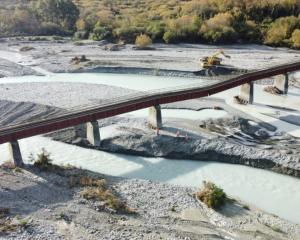
A man left clinging to his kayak for three hours in rough seas and darkness off Northland was winched to safety in a text book rescue and would not have survived much longer in the water.
Hamilton's Paul Gaastra was plucked from the swell off Ripiro Beach on Northland's west coast about 9pm on Wednesday by the experienced Northland Rescue helicopter crew.
Gaastra, aged 58, was unable to get back into his pedal powered kayak and was extremely hypothermic when he was eventually rescued.
It is not the first time the 58-year-old has called on rescue services during the pursuit of his dream to kayak around New Zealand.
In August last year, he was helped ashore by police after he was unable to get back in his kayak when it capsized off Opotiki in the Bay of Plenty.
He had spent 30 minutes in the water that time before he was rescued. He was shivering with cold when he reached shore but was not injured.
On Wednesday night, rescuers say Gaastra came closer to death and would not have lasted much longer in the water.
Northland Rescue Helicopter chief pilot Pete Turnbull said the crew invested plenty of money and time into training for winch rescues and that led to a text book rescue in rough conditions on Wednesday.
The seas were rough, it was blustery wind conditions combined with lack of light, he said.
"I was so proud of the winch team. They did a great job and got the right result," Turnbull said.
Gaastra had activated a personal locator beacon which was detected by an Orion aircraft at Whenuapai airbase. Emergency services were contacted and the rescue helicopter team dispatched from Whangarei.
It seemed the kayaker was unable to make it through the waves to the beach and a paramedic was lowered in to the water and fitted a harness to Gaastra.
"He didn't have long to go and he was severely hypothermic," Turnbull said.
"He'd been bounced around in the swell for about three hours."
Gaastra was flown to Whangarei Hospital and treated before he was released yesterday morning.
The Rescue Coordination Centre of New Zealand says if it wasn't for his distress beacon the man may not have survived in such a remote location.
RCCNZ's Dave Wilson said when his rescuers reached him, the exhausted man simply "let go" of his capsized vessel.
RCCNZ stressed the importance of carrying a distress beacon when in remote locations.
"He did the right thing by carrying a distress beacon. When he was struggling to get ashore through breakers and his canoe capsized, he was able to raise the alarm," Wilson said.
"He saved himself by activating his registered beacon to alert us of his location.
"We urge everyone going out on the water, into the bush, or working in remote locations such as farms, to carry a beacon and make sure it is registered with emergency contact details."












